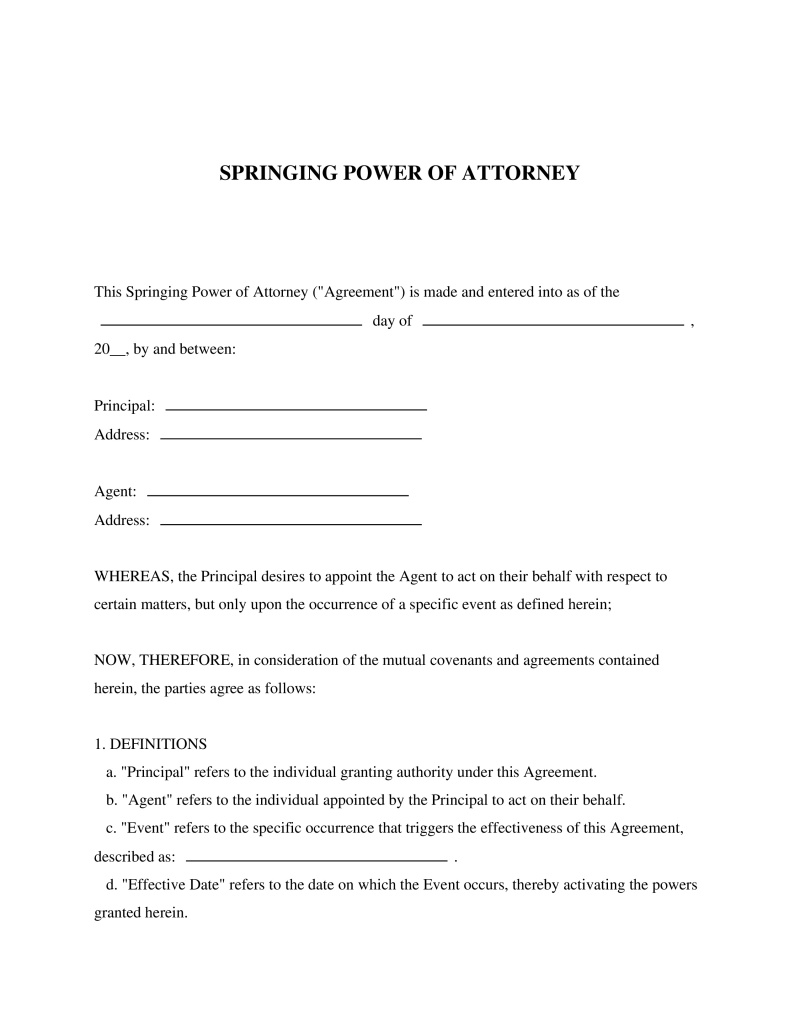A springing power of attorney activates upon a specific event, granting the agent authority to act on behalf of the principal when needed.
Principal Name
Provide the full legal name of the Principal, which is the person or entity granting authority in this document. Use the name as it appears on legal identification, including first name, middle name (if applicable), and last name. Accurate information is crucial, as it confirms the identity of the Principal and may affect the validity of the document.

Table of Contents
What is a Springing Power of Attorney?
A Springing Power of Attorney (Springing POA) is a legal document that becomes effective upon the occurrence of a specified event, typically the principal's incapacity. Unlike a durable power of attorney, which is effective immediately upon execution, a springing POA lies dormant until certain conditions are met, ensuring the principal maintains control over their affairs until it is absolutely necessary to pass on that responsibility. This document is particularly beneficial for individuals who are concerned about prematurely relinquishing control over their financial or health decisions and wish to ensure that their matters are only handled if they are unable to do so themselves due to mental or physical incapacity.
Key Features
Important Provisions
- Definition of Incapacity: Criteria for what constitutes incapacity and triggers the POA's activation.
- Scope of Authority: Specific powers granted to the agent once the document becomes effective.
- Durability Clause: Ensures that the POA remains in effect even if the principal becomes incapacitated.
- Revocation Process: Outlines how and under what conditions the principal can revoke the POA before it activates.
- Agent Duties: Specifies duties, obligations, and limitations on the agent’s power.
Pros and Cons
Pros
- +Provides peace of mind by ensuring decisions are made by a trusted individual only when necessary.
- +Maintains the principal's autonomy by limiting the agent's power until a triggering event occurs.
- +Can be customized to reflect the principal’s specific wishes and circumstances.
- +Reduces potential misuse of power by remaining inactive until certain criteria are met.
- +Facilitates continuity in managing personal, financial, and health-related decisions without court intervention.
Cons
- -Determining incapacity can be complex and require medical certification, potentially delaying decision-making.
- -May cause confusion or disputes among family members regarding when it should become active.
- -Lacks immediate effectiveness, which could be problematic in urgent situations.
Common Uses
- Managing financial affairs when the principal becomes incapacitated due to illness or injury.
- Making healthcare decisions on behalf of the principal when they are unable to do so themselves.
- Executing business transactions for a principal who is temporarily or permanently incapacitated.
- Handling personal affairs, including paying bills and managing investments during periods of incapacity.
- Protecting a principal’s estate in anticipation of future health declines.
Frequently Asked Questions
Do you have a question about a Springing Power of Attorney?
Example questions:
Not the form you're looking for?
Try our legal document generator to create a custom document
Community Discussion
Share your experience and help others
Legal Notice: Comments are personal opinions and do not constitute legal advice. Always consult a qualified attorney for matters specific to your situation.
Comments (0)
Leave a Comment
No comments yet. Be the first to comment!